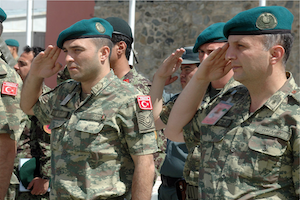An Uncertain Future for the Turkish Armed Forces
By Lars Haugom
September 26, 2017
The secularist identity of the Turkish armed forces is being dismantled in piecemeal ways by the AKP government. There is a risk that the comprehensive changes that are now underway will further exacerbate ideological and political factionalism within the officers’ corps. Ultimately, the politicization of the military and the attempts at its traditional, secularist ethos could provoke a crossing of swords between religious-conservative and secularist factions. Since the coup attempt last year, President Recep Tayyip Erdoğan has taken steps to ensure the loyalty of the current military leadership, while guarding against the possibility of a more politically assertive military leadership in the future. However, it is uncertain if this strategy is also going to restore the internal cohesion of the Turkish armed forces.

Erdoğan’s Dilemma: Preserving the Nationalist Alliance or Making Peace
By Nicholas Danforth
October 17, 2016
Turkey's July 15 coup attempt has transformed the country's politics, and notably it has deepened a dangerous pre-existing dilemma. President Recep Tayyip Erdoğan faces rival challenges from a Kurdish nationalist movement with a longstanding commitment to violence and a nationalistic Turkish electorate which opposes the concessions that will be necessary to make peace with the Kurds. This triangular tension means that Turkey will face a series of trade-offs, setting the country's embattled prospects for peace and democracy against one another.
The Turkish Armed Forces Restructured
By Lars Haugom
September 30, 2016
The Turkish military is undergoing a comprehensive post-coup restructuring process. It is not difficult to understand the rationale behind increased civilian government control of the armed forces after the July 15 coup attempt. However, the Turkish government aims to increase civilian political control and oversight with the armed forces, and not civilian democratic control. There is a risk that the Turkish Armed Forces will become a more politicized and dysfunctional organisation, with greater internal rivalry between the branches and an even more restive officers’ corps as a result of some of these changes.
Altan: The growing power of the military
Mehmet Altan in Özgür Düşünce writes that the traditional rivalry between the mosque and the barracks has given way to a coalition, and that there are those who fear that Turkey is headed toward a “Baathist” regime, in which the military and security apparatus controls the economy. With the exponential growth of the defense industry, some suggest that the military has come to enjoy unprecedented access to financial resources… Will the mosque-barracks alliance then last? Will the rapid increase of wealth in military ranks lead the military to change the position (toward the mosque) that it has had since the beginning of the 19th century? It’s doubtful. It appears that political Islamist fascism has become so desperate that it has had to cling to its historical rival. This inevitably increases the power of the military. It looks as if the military, which briefly appeared to have lost its traditional sovereignty, wants its old power back, now that democracy has been abandoned. The question is if the military after a while is going to want to hold all the reins in its hands and return us to an even harsher period of “tutelage?”
Babahan: No, the military will not stage a coup
Ergun Babahan in Özgür Düşünce comments a news article in the Wall Street Journal according to which the “Palace” (President Erdoğan) is concerned about a prospect of a military coup. The United States will support a coup in Turkey if vital American interests are threatened, and the Turkish Armed Forces will never stage a coup unless it has American support for it. For the moment, Turkey does not have a stance that threatens American interests. Yes, the American administration cannot stand Erdoğan. It dislikes his authoritarian style. However, that’s not a reason enough for a coup. Besides, the Turkish regime does everything that the U.S. administration tells it to do in the region and in Turkey. Yes, it takes some effort to bend Turkey, but this is not anything new. Turkey was always a troublesome ally. The Erdoğan regime is not doing anything, nor has it taken any such decisions, that would jeopardize the interests of American companies. Furthermore, American interests are served by the fact that Turkey has become totally dependent on the West since the downing (last year) of the Russian plane (in Syria.) The same reasons apply to the Turkish military. The military is convinced that Turkey can only survive with the Turkish-Islamic synthesis. And the AKP gets the blame for all human right violations, ensuring the image of the Armed Forces is unharmed.




